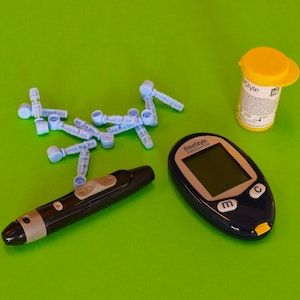Article
Younger Adults With Diabetes Report Low Receipt of Healthcare During COVID-19
Author(s):
Adults aged 18–29 years (87%) with diabetes were more likely to report missed medical care during COVID-19, compared to those aged 30–59 years (63%) or ≥60 years (26%).

Although poorly managed diabetes is a risk factor for severe COVID-19, the extent of which the pandemic has affected diabetes care and management, particularly whether this factor is varying across age groups, remains unknown.
As a result, a team of investigators evaluated access to and use of health care, as well as attitudes, experiences, and behaviors on COVID-19 prevention and vaccination, through the administration of a non-probability, Internet-based survey during February - March 2021.
Led by Catherine E. Barrett, Division of Diabetes Translation, National Center for Chronic Disease Prevention and Health Promotion, Centers for Disease Control, investigators observed that nearly 9 in 10 younger adults with diabetes, aged 18 - 29 years, reported delayed receipt of health care during the COVID-19 pandemic.
Methods
Out of 8,485 adults in the US who were eligible, a total of 5,261 (62.1%) completed the COVID-19 Outbreak Public Evaluation Initiative survey. From this number, 760 (14%) who reported diabetes currently managed by regular medication or treatment were included in the analyses.
The demographic variables for the study included age, sex, race/ethnicity, household income, education level, employment status, US Census region, and health insurance status.
Additionally, the experiences, attitudes, and behaviors related to COVID-19 included knowing someone with a positive test result of had died from COVID-19, perception of being at risk for severe COVID-19, vaccination intention, and a composite measure of support for and adherence of recommended COVID-19 prevention behavior.
Further, in regard to health care access and use, survey respondents reported if they had delayed or avoided medical care due to concerns related to COVID-19, as well as whether their ability to access care or medication was easier, harder, or unaffected as a consequence of the pandemic.
In the statistical analysis, weighted percentages and 95% confidence intervals were calculated by age group (18 - 29, 30 - 59, and ≥60 years). Data in the age groups showed 79 patients in the 18 - 29 years group, 372 patients in the 30 - 59 years group, and 309 patients in the ≥60 year group.
Findings
Investigators observed a larger proportion of younger adults with diabetes reported not knowing someone who had received a positive SARS-CoV-2 test result (90%), compared to adults aged 30 - 59 years (69%) or ≥60 years (57%), P <.001.
Younger adults reported lowest support for COVID-19 prevention guidelines (28%) and COVID-19 prevention behaviors (30%), compared to adults aged 30 - 59 years (62% and 64%, respectively; P <.001) and ≥60 years (51% and 72%, respectively; P <.001).
Additionally, younger adults reported having the lowest percentage of in-person health care appointments (53%), compared to those aged 30 - 59 years (76%) and ≥60 years (85%), P <.001.
Data show both adults aged 18 - 29 years (87%) and adults aged 30 - 59 years (63%) were more likely to report delayed health care, compared to adults aged ≥60 years (26%, P <.001).
Additionally, investigators observed adults with diabetes aged <60 years were less likely to report unaffected access to diabetes medications (44%, 18 - 29 years; 72%, 30 - 59 years), compared to adults aged ≥60 years (96%, P <.001).
Out of survey respondents with diabetes, 28%, 33%, and 17% of those aged 18–29 years, 30–59 years, ≥60 years, respectively reported that their health care was disrupted due to personal concerns that the health care system might be overwhelmed (P = .001).
Overall, the most common reason for disruption in care among younger adults was concern about becoming infected with SARS-CoV-2 (44%), which did not significantly differ from that of adults aged ≥30 years (31%, 30 - 59 years; 27%, ≥60 years, P = 0.151).
Takeaways
Barrett and colleagues concluded younger adults with diabetes reported the lowest receipt of health care during the COVID-19 pandemic. They noted most of these patients did not consider themselves at risk for severe COVID-19 with the lowest engagement in preventive behaviors.
“During the COVID-19 pandemic, efforts to enhance access to diabetes care for adults with diabetes and deliver public health messages emphasizing the importance of diabetes management and COVID-19 prevention, including vaccination, are warranted, especially in younger adults,” investigators wrote.
The study, “Health Care Access and Use Among Adults with Diabetes During the COVID-19 Pandemic — United States, February–March 2021,” was published by the CDC.




